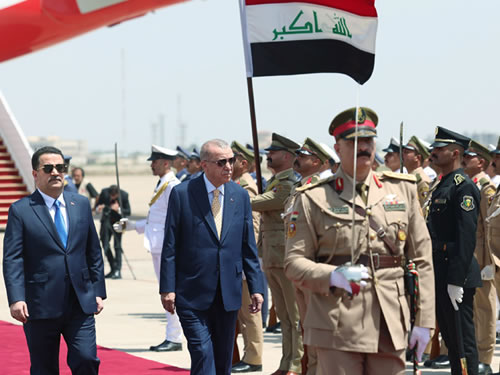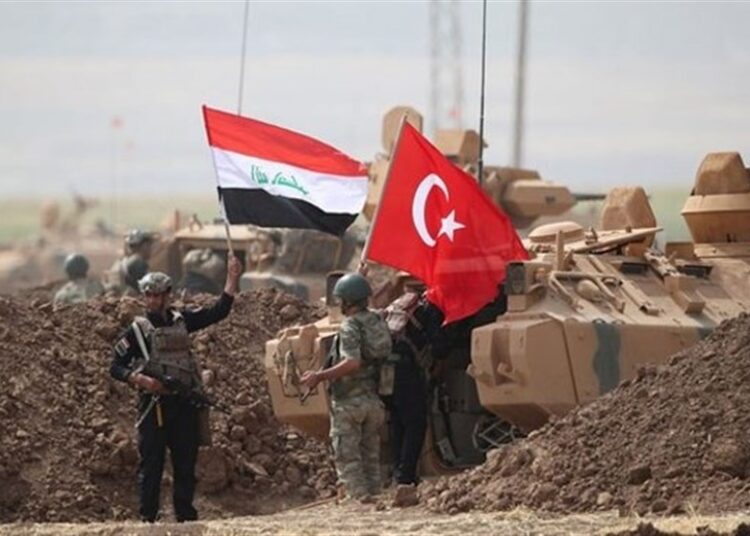Levent Kenez/Stockholm
The Turkish government has submitted the Memorandum of Understanding on Military Training Cooperation signed with Iraq on April 22, 2024 to parliament for approval. Amid a period of enhanced military relations between the two countries, the agreement is expected to be quickly ratified by the legislature. Similar to other agreements signed with various nations, this memorandum encompasses a much broader and more comprehensive range of areas of cooperation, reflecting the deepening ties between Turkey and Iraq.
The MoU was signed on April 22 during an official visit to Iraq led by President Recep Tayyip Erdogan, accompanied by a large delegation. The official rationale for the approval of the MoU submitted to parliament underscores the establishment of mechanisms for military training cooperation between the two countries. Erdogan said the MoU aims to enhance the capabilities of the Iraqi security forces, maintain dialogue in the fight against common threats and contribute to regional security.

According to Article IV of the agreement, the cooperation includes military training and education across various institutions, personnel exchanges, joint exercises and information sharing. It also covers cooperation in fields like logistics, intelligence, military medicine, electronic warfare, cybersecurity and unmanned aerial vehicles. There is a focus on professional development, disaster management and training related to special forces, military intelligence and counterterrorism. Additionally, the agreement involves collaboration in defense planning, public relations and the development of training systems for noncommissioned officers.
Turkey has recently ramped up its diplomatic efforts in Iraq, initiatives that are beginning to bear fruit. In April 2024 the Iraqi National Security Council took significant action by banning the activities of the Kurdistan Workers’ Party (PKK), which Turkey designates as a terrorist organization and views as a threat to Iraq’s security. This development signals an improvement in relations between Turkey and Iraq, with plans for Turkey to establish buffer zones within Iraqi territory. However, the Baghdad government insists on a mechanism that places responsibility for security in its hands, proposing a solution that involves the presence of Iraqi forces on the ground.
Turkey conducts military operations in Iraq, deeming them necessary to counter the PKK, and maintains several military bases in the northern part of the country. Before 2018 Turkey had approximately 10 bases in the region. Currently, numerous small bases and forward operating centers are scattered throughout northern Iraq, with the Bashiqa Base standing out. This base made headlines, having been targeted by the PKK multiple times in 2024, drawing media attention and raising concerns.
On August 15 Turkey and Iraq’s defense ministers signed the Memorandum of Understanding on Military, Security Cooperation, and Counter-Terrorism following talks in Ankara. The agreement, which both parties described as historic, includes plans to establish a Joint Security Coordination Center in Baghdad. Additionally, the Turkish base in Bashiqa will be handed over to the Iraqi Armed Forces, where a Turkey-Iraq Joint Training and Cooperation Center will be operational.
As part of the memorandum, the Baghdad government has opened 22 border outposts to enhance border security with Turkey. Iraq shares a 362-kilometer border with its neighbor, underscoring the importance of this collaboration for regional stability.
As outlined in the defense memorandum, Turkey has lifted visa requirements for Iraqi citizens. Starting September 1, a new visa regulation will go into effect, granting visa-free entry to Iraqis aged 15 and younger and those over 50.
Turkey aims to leverage military developments to boost economic growth; however, a significant obstacle remains. It has been a year since operation of the Iraq-Turkey oil pipeline was halted, and there has been little progress in resuming the flow of oil. The pipeline, which carries approximately 0.5% of global oil supply, has seen increasing demand from Western countries for its reopening.
The line was shut down by the Baghdad government in March after Turkey began exporting oil from the semi-autonomous Kurdistan region without the permission of Iraq’s federal government. Following an international arbitration ruling concerning the two countries, Turkey was ordered to pay compensation.
During Erdogan’s visit in April, some progress was noted, with Turkey indicating it would be ready to resume oil shipments in October. However, uncertainty persists due to fluctuating prices and financial issues regarding commissions for international companies involved in the process.
Observers predict that if the oil pipeline is reopened, the likelihood of military commitments being fulfilled will significantly increase.












